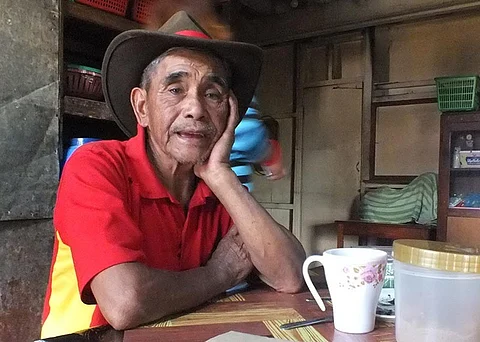

TO APPEASE the living and the dead, Sagada elders continue to practice cleansing rituals when accidents occur.
Esteban Capuyan Bosaing Sr., who stands as one of the towns respected elder relays traditional prayers and rituals play an important part in keeping the soul of the departed as well as the those still with us at peace.
The 73–year-old elder called Lakay Pulat (Old man Pulat) said cleansing rituals for accidents like road crashes will have its corresponding rituals that have to be performed by the community.
Elders and family members of the victims may go back to the crash site and perform the “Ay-Ayag,” where offerings of tapuey (rice wine), etag (smoked meat) and cooked rice is brought.
The group then proceeds to call the names of the crash victims and cajole them to come home, to return to where they live and leave the accident site.
A “dawes” (cleansing) is then performed by elders involving the initial butchering of a dog or a chicken ending with the offering of a pig to complete the ritual.
The “Uplipet” ritual is performed for the person who met the accident in order to cleanse the spirit of the incident with the elders going to the home of the victim and butchering a small chicken, however the family cannot partake of the butchered animal.
Lakay Pulat relays this is to be done for the chain of bad luck to stop for the family as well as the chain of accidents.
“People still believe in these rituals today and we perform this when needed,” he added.
During the first quarter of the year, police records show vehicular traffic accident recorded a 51 percent share from the total of 8,368 total cases in 2017 with 4,279.
The leading cause of vehicular traffic accidents pointed to driver’s error followed by mechanical defects, and road conditions.
Cars had the highest involvement in traffic accidents with 1,828 followed by motorcycles with 881, vans with 581, trucks with 438, jeepneys at 381, trucks with 129, bus with 44, and pickups with four cases.
The Regional Law Enforcement Coordinating Council (RLECC) has sounded the alarm over an increasing count of vehicular accidents in the entire region which comprise 60 percent of police cases recorded.
RLECC records show 60 percent of the crimes recorded in the region from January to July involved vehicular traffic accidents.
From January to July a total of 4,264 cases with 2,559 incidents involving vehicular traffic accidents or 60 percent, followed by non-index crimes, 1,033 or 24 percent, and index crimes, 672 or 16 percent.
There are eight focused crimes under the index crime, which include physical injuries, theft, robbery, rape, murder, carnapping, homicide, and robbery.
Vehicular accidents in the region were caused by either human error or mechanical error, leading to collision, for instance and form part of the crime rate because of the damage to the property of another, physical injuries, and sometimes even deaths.
The National economic and Development Authority describes Cordilleran roads are prone to road cuts/closures and accidents. CAR roads are highly susceptible to road cuts/closures and accidents. The roads in CAR incurred the highest in the annual number of road closures at 981 from 2004-2005, affecting some 238 kilometers of national roads and resulting in roughly P1.171 billion in losses.
CAR roads are accident prone with the region placing 6th nationwide in 2007 in road accident frequency at 312, with eight incidents or 3 percent traced to road defects.
This story was produced under the Bloomberg Initiative Global Road Safety Media Fellowship implemented by the World Health Organization, Department of Transportation and VERA Files.